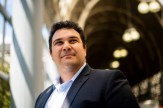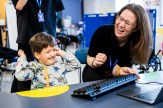Northeastern Hosting Local Students for Public Science Day
Northeastern University Continues Efforts with Boston Public Schools to Increase Science and Math Achievement in Elementary and Middle School Students
Local students to participate in nanotechnology activities at Northeastern for Public Science Day in Boston; Step UP Program Initiatives Continue to Thrive
WHAT: Northeastern University will host students from the Curley and Lewenberg Schools in Boston to explore the world of nanotechnology as part of an entertaining and educational Public Science Day. The city-wide event is sponsored by the American Association for the Advancement of Science (AAAS) and corresponds to their annual meeting in Boston. Northeastern has also been working with the Curley and Lewenberg Elementary Schools as part of Step UP, a partnership between eleven Boston public schools and local colleges that aims to help close the achievement gap.
Boston’s Mayor, Thomas M. Menino, has been invited to attend the Public Science Day luncheon where more than 300 students participating at the 6 area colleges will convene as a group. Dr. Greta Binford, Assistant Professor of Biology at Lewis and Clark College, will give a presentation about the world of spiders to the students. Boston’s Superintendent of Schools, Carol Johnson, is also invited to attend.
As part of Public Science Day at Northeastern, students will have a chance to play “The Incredibly Almost-True Adventures of GeckoMan and Nano Nancy,” an interactive video game that teaches the player about the principles of nanomaterial sciences. With the help of Northeastern graduate students and researchers, they will also have an opportunity to learn about nanomedicine by working in teams to create their own magnetic (iron oxide) nanoparticles.
The activities at Northeastern are organized and hosted by students, staff and faculty of Northeastern’s Center for STEM (Science, Technology, Engineering and Math) Education, the NSF Nanoscale Science and Engineering for High-rate Nanomanufacturing, the NSF Graduate Teaching Fellows in K-12 Education Program and the IGERT Nanomedicine program.
Northeastern’s efforts for the Step UP program include professional development for teachers, launching the First Steps in Mathematics with teachers, coordinating family math sessions to engage parents in their childrens’ education, and providing direct academic support during and after school. Over twenty Northeastern students are providing more than eighty hours of direct instruction each week to students at partner schools. Other Step UP partner universities include Boston College, Boston University, Tufts University and Harvard University.
WHERE: Northeastern University, Dodge Hall (324 Huntington Avenue) and Behrakis Health Sciences Center (30 Leon Street)
WHEN: Thursday, February 14, 2008, 9:15-11:25 a.m.; depart for Sheraton Boston at 11:45 a.m. for luncheon
For more information about Public Science Day activitiesat Northeastern, or about Step UP programs, please contact Jenny Eriksen at(617) 373-2802 or j.eriksen@neu.edu.
About the Center for STEM Education at Northeastern
This newly-established University-wide Center aspires to serve as the connecting link between all the University Science, Technology, Engineering, and Math (STEM) Departments and the School of Education. Our main goal is to play a key role in shaping the GK-20 STEM Education vision at Northeastern University and put the University on the national map in this field. This will be accomplished in part by consolidating and coordinating existing outreach programs and by creating new ones that will have a significant impact on the STEM pipeline, on STEM teaching and learning in GK-20, on GK-12 STEM outreach, and on STEM Education Research.
About the NSF Center for High-Rate Nanomanufacturing
The Center for High-rate Nanomanufacturing is focused on developing tools and processes that will enable high-rate/high-volume bottom-up, precise, parallel assembly of nanoelements (such as carbon nanotubes, nanoparticles, etc.) and polymer nanostructures. The Center’s nanotemplates are utilized to conduct fast, massive directed assembly of nanoscale elements by controlling the forces required to assemble, detach, and transfer nanoelements at high rates and over large areas. The developed nanotemplates and tools will accelerate the creation of highly anticipated commercial products and will enable the creation of an entirely new generation of applications.
About IGERT
IGERT Nanomedicine Science and Technology is a new integrated doctoral education program in the emerging field of Nanomedicine, created with support from the National Cancer Institute and the National Science Foundation. The program aims to educate the next generation of scientists and technologists with the requisite skill sets to address scientific and engineering challenges, with the necessary business, ethical and global perspectives that will be needed in the rapidly emerging area of applying nanotechnology to human health. Doctoral students affiliated with this program participate in a variety of educational outreach programs in collaboration with The Center for STEM Education.
About GK12-PLUS
This program provides funding to graduate students in NSF-supported STEM disciplines to acquire additional skills that will broadly prepare them for professional and scientific careers in the 21st century. Through interactions with teachers and students in K-12 schools, and with other graduate fellows and faculty from STEM disciplines, graduate students are improving communication, teaching, collaboration, and team building skills while enriching STEM learning and instruction in partner K-12 schools. This program is coordinated by The Center for STEM Education and the School of Education.
About Northeastern
Founded in 1898, Northeastern University is a private research university located in the heart of Boston. Northeastern is a leader in interdisciplinary research, urban engagement, and the integration of classroom learning with real-world experience. The university’s distinctive cooperative education program, where students alternate semesters of full-time study with semesters of paid work in fields relevant to their professional interests and major, is one of the largest and most innovative in the world. The University offers a comprehensive range of undergraduate and graduate programs leading to degrees through the doctorate in six undergraduate colleges, eight graduate schools, and two part-time divisions. For more information, please visit www.northeastern.edu.




